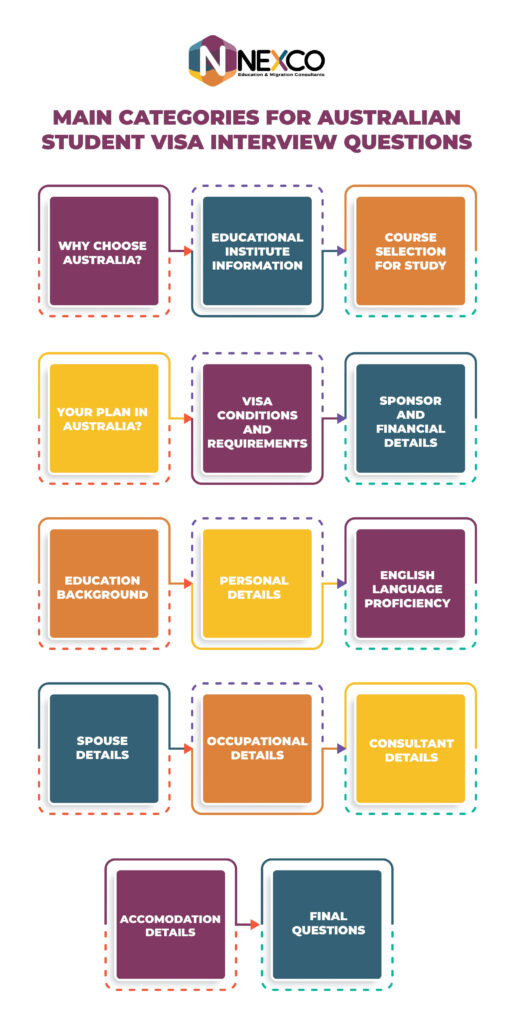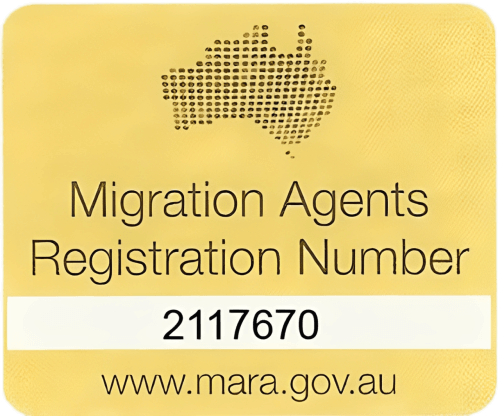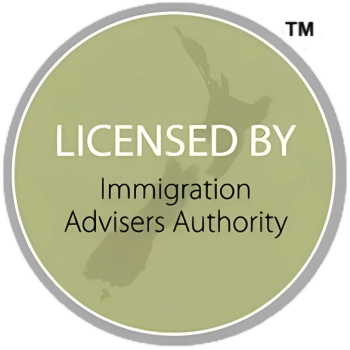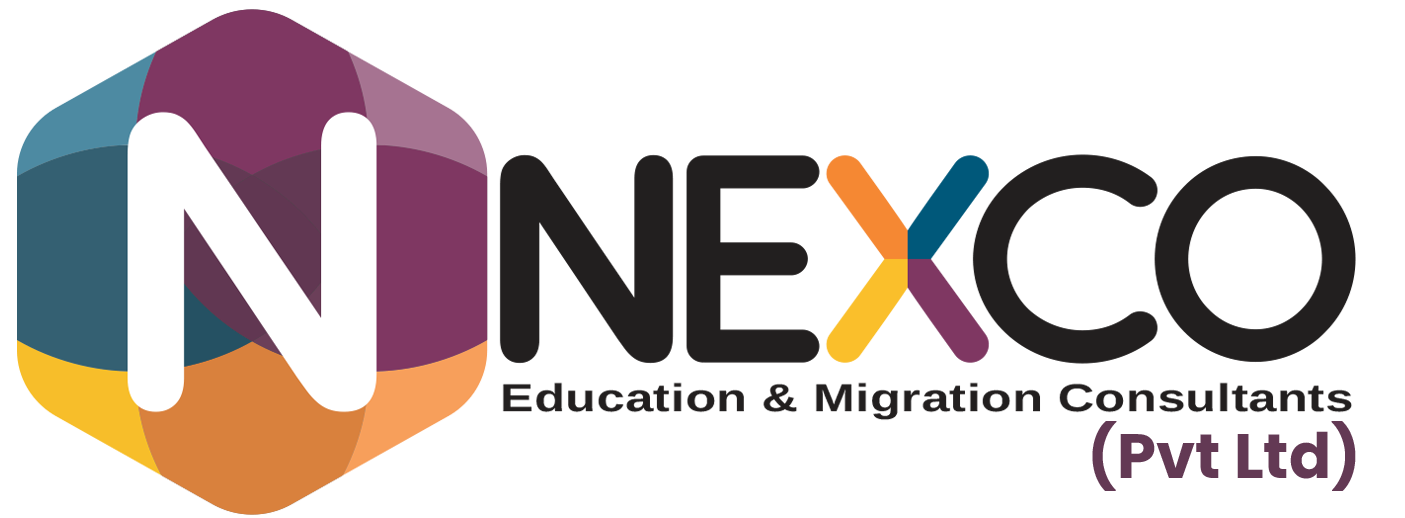A Comprehensive Guide to Australian Embassy Interview Questions and Answers for Student Visa
Why Choose Australia
Educational Institute Information
Course Selection for Study
Your Plans in Australia
Visa Conditions and Requirements
Sponsor and Financial Details
Educational Background
Personal Details
English Language Proficiency
Spouse Details
Occupational Details
Consultant Details
Accommodation Details
Final Questions
Where to get Expert Help for Australian Student Visa Interview Preparation
Bonus: Tips on How to Ace Australian Embassy Interview for Student Visa
FAQ’s
Final Thoughts
Australia has reopened its borders for international students after COVID-19. A student visa is compulsory if you wish to study, work or live in Australia during your study period. After your application process, it is mandatory to ace your visa interview to receive your Australian Visa.
Here is a list of Australian Embassy Interview Questions and Answers for Student Visa.
Most frequent questions for Australian Embassy Interview Questions and Answers for Student Visa include the purpose of your trip, why you want to go to Australia, what are your future plans, your qualifications, and reasons for choosing the particular university and university location, etc.
Here are some of the Australian Embassy Interview Questions and Answers for Student Visa, coming directly from the first-hand experiences of the candidates who appeared in the interview! We will also look at the desirable answers for the Australian Embassy Interview Questions and Answers for Student Visa.
Frequently Asked Australian Embassy Interview Questions and Answers for Student Visa in Embassy

Australia is one of the most sought-after studies and immigration destinations around the globe. Thousands of subclass 500 (student visas) are issued annually by the Australian department of home affairs.
Regarding the visa interview, the Australian department of home affairs wants to ensure that you meet all the mandatory requirements for an Australian student visa, including Genuine Temporary Entrant, financial requirements, English language proficiency, character, and health requirements. They also want to ensure that the information you provided is correct!
It is necessary to prepare for the interview considering these requirements. Contact us to ensure your preparations are up to the mark and meet all the mandatory requirements!
Here is the list of frequently asked Australian Embassy Interview Questions and Answers for Student Visa as per the students who appeared in the Australian student visa interview!
Why Choose Australia
1. What is the purpose of your trip to Australia?
The visa officer is just trying to ensure that you provided genuine information during your visa interview. Provide a simple and to-the-point answer indicating that you intend to pursue a degree or your intended study program in Australia.
2. Why did you choose Australia for education?
You will need to be careful while answering this question. Do your homework and be honest in your response. List the reasons why you chose Australia over other countries for study.
3. Why Australia and not any other country?
In response to this question, you will need to indicate the reasons Australia offers compared to the other universities. Tell them that Australia has state-of-the-art educational facilities, a wide variety of degree options, a better job market after graduation, and diverse culture, etc.
4. Have you ever traveled to Australia?
Simply tell them if you have ever traveled to Australia or not! If your answer is yes, provide the reason for your visit and the time you visited Australia with your answer!
Educational Institute Information
5. Which College/University are you going to in Australia?
State the name of the University you have received the offer from and have enrolled yourself! Make sure to state the name of the University correctly.
6. Where is your College/University located?
The visa officer wants to make sure that you are well aware of the institute you have enrolled on yourself. Make sure that you not only know the exact location of your institute but also know the specialties of the location your institute is located in.
7. Why have you selected College? Why aren’t you going to University?
You can expect this question if you have enrolled in the College and not University. Tell the case officer that your desired course is available in the particular College or any other reasons you have preferred College over the University.
Also, demonstrate your motivation behind choosing a College rather than a university. Ensure that your answer matches your justification with your visa application, as the case officer is trying to verify the information you have already provided.
8. Have you applied to any other University or College?
Tell the case officer honestly if you applied to any other college/university except the one you are enrolled in.
9. What is the contact Number of your College/university?
Simply provide the contact number of the college/university you have enrolled in.
10. What is the Email address of your College/University?
Just like the contact number, you simply need to provide the email address of you the institute you have enrolled in yourself!
Course Selection for Study
11. Why have you chosen this subject?
You will need to ensure your desire to attend the course in response to this question. Convey to the case officer why the particular course is essential for your future and what role it plays in your career goals.
Your response should prove to them that you are not using the study as an excuse to move to Australia.
12. What have you done as a hobby, interest, or project following your course?
The visa officer wants to ensure that you are passionate about your chosen course by looking into your background. You don’t want to stumble here, be clear and highlight your interest and any hobby relevant to your course.
13. How long will the course last?
Communicate the exact length of your course duration in Australia. Tell them when your course is going to start and when it will end. Be careful as this information can be verified easily.
14. What is the cost of the selected course?
Answer with the amount in AUD as indicated in your confirmation of Enrollment (CoE).

15. Is this course available in your home country?
Your case officer wants to verify whether the reasons you provided to study in Australia are justified or not. Through your answer, you will need to convey your motivation to study in Australia and why Australia is a better option than your home country.
16. This course is available in Pakistan and why are you going to Australia?
You need to be careful while providing answers to this question. Convey the reasons why you preferred Australia over your home country. Tell them that Australia is home to world-class institutes with state-of-the-art facilities unavailable in your home country.
Your Plans in Australia
17. What do you plan to do during your semester break?
Be honest and share your plans with the case officer. You can tell them you will visit your family during your semester breaks back in your home country. If you have any other plans, let them know.
18. What are your plans after completing the intended course in Australia?
This question could be a tricky one. By asking this question, the visa officer wants to know whether you want to stay in Australia or not. Mind that your student visa would not allow you to stay in Australia after you have completed your studies in Australia.
Tell the visa officer that you plan to return to your home country after completing your studies.
19. Do you plan to continue studying in Australia after your recent course ends?
Just tell the case officer directly whatever your intentions and plans are. Convey them honestly if you are not clear about your plans.
20. Do you plan to apply for permanent residence after completing your course in Australia?
Be careful while answering this question. Answer No to this question because your student visa does not allow you to stay in Australia. Also, the Australian Government wants you to return to your home country after completing your studies.
Responding with a yes to this question can result in rejecting your Australian student visa.
21. How can we trust that you will return to your home country after you have completed your course?
You will need to convince the case officer that the sole purpose of your visit to Australia is attending the degree you have enrolled in. You can share your career goals and plans with your family once you return to your home country to convince the case officer.
22. Any plans to work in Australia?
Remember that you work only part-time while on your student visa in Australia. So elaborate and convey to the case officer that you will work part-time in Australia as your student visa allows.
Tell the case officer “no” if you are not planning to work in Australia.
Visa Conditions & Requirements
23. Do you know your visa conditions?
The case officer wants to know if you are aware of your visa conditions. Make sure that you are well aware of your visa obligations. Convey your visa conditions in simple words to the case officer.
24. What do you know about work limitations?
You are allowed to work for 40 hours per 2 weeks in Australia. While during your semester break, you can work full-time. Answer the question in a way that shows you are well aware of the work limitations on a student visa in Australia.
Sponsor and Financial Details
25. Who is funding you?
Tell the case officer who is sponsoring your study and stay in Australia.
26. Why he/she is funding you?
If anyone except your father or mother sponsors you, you can face this question. Convey why anyone except your parents is funding your trip to Australia. Make sure your answer is brief, comprehensive, to the point, and convincing.
27. Can you please tell me your sponsor’s occupation and annual income?
Tell the case officer about your sponsor’s occupation and annual income. Ensure that your answer matches the proofs you have provided along with your visa application, including the pay slips, bank statements, etc.
28. What would be your per-year living cost in Australia?
Again, the case officer wants to know if you are well aware of Australia’s living conditions and expenses. Tell the case officer your total living expenses, including accommodation, groceries, gas, electricity, phone, internet, public transport, entertainment, etc.
- If you are going without any spouse or dependent, tell them that your per-year living cost, excluding your fee, will be AUD $21,041 If any dependent is coming with you to Australia, tell them you will additionally bear AUD $7,362 per year.
- If a child is coming with you, an additional AUD $3,152 will be added to your annual living expenses.
29. Is there anyone else except you dependent on your sponsor?
Make sure you answer this question honestly, as this is verifiable via the documents you have provided with your visa application. Share honestly with the case officer if anyone is dependent on your sponsor except you.
30. Have you attached any bank statements?
The answer is as simple as it seems. You must have provided the bank statements with your visa application. Tell them clearly that yes, you have provided the bank statement. Make sure that you are not doubtful in response to this question.
31. Which bank the bank statement you have attached?
The case officer wants to ensure that you are a genuine student and are well aware of your case. Tell the name of the bank of which the bank statement you have attached.
32. Where is the bank located? Which is the bank statement you have attached?
Tell the branch location where your sponsor has opened your account and availed the bank statement.
33. What is the amount mentioned in your bank statement?
Again, the case office wants to make sure that you are well aware of your visa application by asking for the minute details of your application. Tell them the amount mentioned on your bank statement. Make sure that the amount you tell matches the amount on your bank statement.
34. What if you face financial contingency or any issue?
Be confident while answering this question. Tell the case officer that your sponsor has enough funds to cover your stay in Australia. Stumbling on this question can result in the rejection of your student visa.
35. What would be your approach to facing financial problems during your stay in Australia?
Again, you will need to be confident while answering this question. Tell the visa officer that you will likely not face any financial issues as your sponsor have enough funds to cover your stay in Australia.
36. Do you hold any assets in your home country?
Enlist all your assets in your home country, including homes, businesses, Property, cars, etc. A satisfactory answer to this question will lead the case officer to believe that you will go back to your home country after completing your studies and will strengthen your case.
But make sure that your answer matches the proofs and documents you have provided with your application.
37. Who will look after your assets in your home country?
Tell them the details of whoever will look after your assets in your home country. You can ask your family or friends to do so.
38. Do you pay any income tax?
The desirable answer to this question would be Yes! The Australian Government wants you to be a responsible tax-paying citizen. Make sure you also have proof of being a tax-paying citizen and your visa application.
Educational Background

39. What is your last qualification?
Tell the case officer that you have completed year 12 if you are applying for an undergraduate program and have completed graduation if you are applying for a postgraduate program.
40. When have you completed your last qualification?
Tell the year you have completed your last qualification.
41. Can you provide any documents of your previous qualification?
If you appear in a face-to-face interview, show your official result cards and transcripts. If you are expecting to appear in an on-call interview, tell the case officer that you already have provided the scanned copies of your official transcripts and result cards along with your visa application.
42. Do you have any gaps during your study?
Answer this question honestly, as the case officer can easily verify if there are any gaps in your study via your educational documents. Convey the details on why there are gaps in your study.
43. How do you cover your study gap?
The case officer wants to ensure you are a responsible student via this question. Share the reasonable details of the activity that you did during the period of your study gap.
44. What subjects did you study during your intermediate?
The case officer wants to determine that your study background matches the course you have chosen to study in Australia. Share the subjects that you took during your intermediate or your last qualification.
Personal Details
45. What is your Date of Birth?
The case officer is trying to verify your personal information, as simple as it seems. Tell the date of birth as mentioned on your passport.
46. What is your Passport Number?
The case officer wants to verify your passport number. Share your passport number with the case officer in response to this question.
47. What is Your CNIC Number?
Share your CNIC number as mentioned on your National Identity Card.
48. What is your father’s name?
Share your father’s full name with the case officer as mentioned on your passport.
49. What does your father do?
Tell the details of your father’s business or occupation. Ensure your answer matches the proofs you have provided with your visa application.
50. How much is your father’s monthly income?
The case officer is trying to verify that you are a genuine entrant via a series of questions related to your personal information. Share the monthly income of your father with the case officer as mentioned in the details you have provided with your visa application.
51. How many brothers and sisters do you have?
As simple as it seems, all you need to do is share with the case officer the number of siblings you have.
52. Are your siblings also interested in going to Australia for future education?
The desirable response to this question would be “I don’t know” or “no” in response to this question.
English Language Proficiency
53. Have you completed any language courses?
The case officer wants to have an insight into your language proficiency. Tell the case officer the language course details if you have attended any.
54. How many bands have you secured in IELTS?
Be honest in response to the question, as the case officer can easily verify your answer via your IELTS report card. Share your overall IELTS score and score on each module.
If you have taken any other language test like PTE, share the overall PTE scores and scores on each module.
55. Why is your score so low?
Convey the reasons or any exceptional circumstances that might have contributed to your low score. With that, make sure that you tell the case officer that you are working on your English language skills and improving constantly.
56. Why is your score so high?
You might not be expecting this question from the case officer. Still, you can face this question during your Australian Embassy Interview Questions and Answers for Student Visa if your scores on the language proficiency test are exceptionally higher.
Tell the case officer the circumstances that led to your exceptional results, your educational background, and if you have taken any language course to improve your English.
57. When did you take your IELTS/PTE Exam?
Be honest and share the date of your IELTS/PTE exam as mentioned on your report card.
Spouse Details
58. Are there any community ties of spouses in Australia?
You can expect the questions regarding your spouse if your spouse is going with you on your student visa. Respond to this question honestly according to the details you have already provided with your visa application.
59. Who will sponsor your spouse?
Share your spouse’s sponsor details if your spouse has any sponsor.
60. When did you get married?
As simple as the answer to this question seems, tell the date when you got married.
61. What is your spouse doing currently?
Share whatever your spouse is doing at the time of the interview. If your spouse works, share their occupation with precise and comprehensive details.
62. Is your spouse coming with you or not?
Be honest while answering this question. If your spouse is coming with you, respond with “yes” and “no” if your spouse is not traveling with you to Australia.
Occupational Details

63. Now, what are you doing in your home country?
Tell the case officer whatever you are doing at the time of your application. Share the details of your occupation if you are working at the time of the interview.
64. Your Workplace details in your home country?
The case officer wants to verify the details of the work-related information with your visa application. Tell the case officer the details and nature of your occupation. You can also share the details about your workplace in response to this query.
65. Have you provided the email of your workplace?
The case officer wants to ensure that you have provided a genuine work experience letter via your workplace email. Answer with “yes” if you have provided the email of your work.
Consultant Details
66. Who is your consultant?
If you have availed of the services of any consultation Company, tell the visa officer the name of your consultants.
67. What is your consultant’s office location?
Tell the location of your consultant’s office services of which you have availed.
Accommodation Details
68. Do you have any relatives in Australia?
Provide an honest answer to this question. Share the details and addresses of any family members already residing in Australia.
69. How would you arrange your accommodation in Australia?
Let the case officer know what will be your living arrangements in Australia. If any friend or relative will arrange the accommodation for you, convey their and your accommodation details to the case officer.
Final Questions
70. Why should we grant you a student visa?
It is crucial to be well prepared for this question. Enlist the benefits you will avail yourself of from studying in Australia, e.g. high standards of education, state-of-the-art facilities, etc. Also, emphasize how you will benefit the institute you are enrolled in and your contributions to the University you are going to.
Think thoroughly and answer this question thoroughly.
71. What will you do in case your Visa gets rejected?
This is your chance to prove your passion for studying in Australia. Tell the case officer that you will prepare even better for the next time. Tell them you will make sure you will not repeat the mistakes that led to your visa rejection.
72. What led to your previous visa refusal?
You can be asked this question if you have reapplied for the Visa. Be honest and confident and convey the exceptional circumstances that led to your previous visa refusal.
Avoid your Visa refusal by getting expert services for the best preparation for the Australian Student Visa Interview!
Where to get Expert Help for Australian Student Visa Interview Preparation
Expert consultants like Nexco Consultants can help you prepare best for the Australian Student Visa interview.
Here is why you should choose Nexco Consultants:
Why Nexco Consultants
- Experts at Nexco Consultants can help you prepare for the Australian Student Visa Interview customized according to your case.
- Professional Counselors at Nexco Consultants have helped hundreds of students secure the Australian Student Visa.
- If you think we are exaggerating, check out our reviews!
Bonus: Tips on How to Ace Australian Embassy Interview for Student Visa

Be Honest:
If you want to be granted a Student visa, you must be honest while answering all the questions. It is crucial because almost all the questions you have answered are verifiable, and you don’t want to be caught faking.
Be On Time:
If you are attending a face-to-face student visa interview, you must be on time. Don’t be too early or too late, as this can negatively impact the case officer.
Greet the Interview Panel:
Greet the interview panel/case officers in a well-mannered way. You don’t want to leave any negative impression on the interview panel.
Don’t Forget All the Relevant Documents:
This is important! Don’t forget to carry your application supporting documents. Make sure that you have your original qualification and personal documents. Carry your bank statements with you. Double-check that you have all the documents with you.
Dress Properly and Comfortably:
Make sure that you are in formal dress and feel comfortable and confident. Don’t be too informal or exaggerate. Remember, simplicity is the best in such scenarios.
Be Focused and Attentive:
Make sure that you are focused on the interview. Listen to all the questions attentively and provide to-the-point and comprehensive answers.
Keep Your Goals Clear:
Be clear and confident about your goals. Make sure you know what you want and how you will achieve that.
Listen Before You Respond:
Don’t jump into responding to the question. Listen carefully and attentively; once the case officer has finished the question, answer appropriately.
Know Your Strengths:
Be confident and make sure that you are well aware of your strengths. Confidence and being well-aware of yourself will increase the chances of your student visa grant.
Be Reliable:
Make sure that all the answers you have provided align with the documents you provided with your visa application. Lastly, be accurate, to the point, comprehensive, and brief while answering the questions.
FAQ’s
1. Does Australian Embassy conduct interviews for a student visa?
Yes! To get the student visa, the student will have to go through an interview with the embassy. However, you may appear in an on-call interview after COVID.
2. How can I pass my student visa interview?
All you need to do is be honest, concise, clear, confident, and comprehensive while answering the Australian embassy interview questions for a student visa. Here is a list of tips that can help you clear the answers:
- Be Honest
- Be On Time
- Greet the Interview Panel
- Don’t Forget All the Relevant Documents
- Dress Properly and Comfortably
- Be Focused and Attentive
- Keep Your Goals Clear
- Listen Before You Respond
- Know Your Strengths
- Be Reliable
3. What questions would I be asked about a student visa?
You will be asked questions about your intentions to study in your destination country. The interview will also include questions related to your sponsor, the institute you have enrolled in, your assets in your home country, your family and personal details, your English language proficiency, your educational background, etc.
4. How do I introduce myself during GTE Interview?
- Put a smile on your face
- Share your name along with the greeting
- Be seated
- Listen to the questions carefully and answer appropriately!
5. Is an interview compulsory for an Australian Student visa?
Whether you would be called for an interview or not depends upon your case. You may receive an on-call interview by the Australian High Commission.
6. What are the GTE Interview questions for Australia?
Here are the few questions that may face during a GTE interview:
- What is the structure of this course?
- What do you like about this course?
- What are the main reasons you choose this University?
- What do you know about the culture of the country you are going to?
7. Is it difficult to get a student visa for Australia?
No! Compared to other countries, getting an Australian Student visa is easier. This is one of the main reasons why Australia is a popular study destination for international students. All you need to do is meet the Australian student visa requirements and enroll yourself for a full-time course under CRICOS to secure the subclass 500 visa.
8. How do you greet a visa officer?
If you are attending a face-to-face interview, enter the room at your turn. For face-to-face and on-call interviews, greet the visa officer warmly with a hello/hi. The case officer may ask you how you are doing; answer the question politely!
9. How many days does it take to get an Australian Student visa?
Most Australian student visa applications are processed in 4 weeks. You can enter Australia 90 days before your classes start after being granted an Australian student visa. You must also provide your residential details once you are in Australia.
10. How do I clear my GTE for an Australian Student Visa?
Here are a few tips to clear your GTE for an Australian student visa:
- Be genuine in your statement of purpose
- Explain the circumstances in your home country honestly.
- Explain the reasons behind choosing a specific education provider.
- Demonstrate that you have done enough research into your intended course.
- Show how your course is going to benefit you in the future.
- Elaborate on your immigration history.
- Elaborate why you have preferred Australia over other countries.
- Make sure that you have provided all the supporting documents.
- Make sure to establish a connection between your course and your previous qualification.
11. Why is an Australian student visa rejected?
The primary reason you got your Australian student visa rejected is the lack of funds on your bank statement. Ensure that your bank statement has enough funds to cover your stay in Australia.
Other reasons could include faking in your documents, a mismatch of information obtained from your interview, and the documents you provided with your visa application.
12. What are the Australian student visa conditions?
These are the requirements mentioned in your Australian Student Visa:
- An Australian student visa allows you to live, work and study in Australia for five years.
- You can work for 40 hours per fortnight in Australia on an Australian Student Visa.
- You can get further information from the Department of Home Affairs Website.
13. Which intake is best for Australia?
February intake is best to get admission in Australia, as this is considered the primary intake in Australia. Apart from the February intake, you can also get admission in the July intake.
14. How much is a bank statement required for an Australian Student Visa?
For students, the bank statement for a year should be at least AUD $21,041. The minimum bank statement for students accompanied by family members should be AUD $75,529.
Final Thoughts
Australia has reopened its borders for international students. You may need to appear in an on-call or face-to-face interview for the Australian Student visa. Case officer will ask questions from why choose Australia, educational institute information, course related questions, your plans in Australia, visa conditions and requirements, sponsor and financial details, educational background, personal details, English language proficiency, spouse details, occupational details, consultant details and accommodation details etc.
Be confident, concise, appropriate, and honest while answering all the questions. Make sure that all your answers align with the information you have provided with your visa application.





